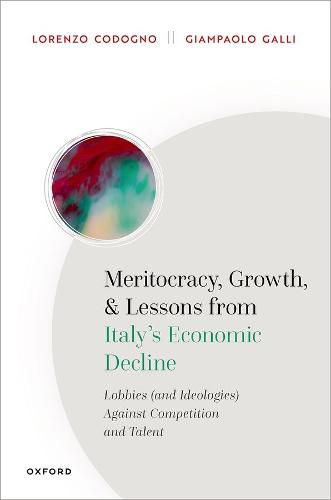Readings Newsletter
Become a Readings Member to make your shopping experience even easier.
Sign in or sign up for free!
You’re not far away from qualifying for FREE standard shipping within Australia
You’ve qualified for FREE standard shipping within Australia
The cart is loading…






This book draws lessons on the importance of meritocracy for economic growth by analysing Italy’s economic decline in the past few decades. Connections, rather than merit, are a long-standing feature of the Italian elites, even in the corporate sector. This became a significant problem when Italy’s economy could no longer grow due to imitation, devaluation, and public debt, and faced the challenges of becoming a frontier knowledge-based open economy. This book uses international comparisons on social capital, governance, the role of the public sector, efficiency of the judiciary, education, gender and social inequality, social mobility, corporate standards, financial structures, and more to evaluate Italy’s economic performance. It argues that the arrogance of mediocracy is more damaging than that of meritocracy.
Italy experienced an economic miracle after the Second World War, and it is still an advanced economy and a member of the G7. Until the 1960s it seemed destined to catch up with the best-performing countries. Then the growth engine stopped, its debt skyrocketed, and Italy became a weaker member of the Eurozone. Many other countries in the world have heavy historical legacies and low social capital, and many others have to make the jump from imitation led growth to endogenous growth. The lessons drawn from studying Italy’s case can therefore have important international applications.
$9.00 standard shipping within Australia
FREE standard shipping within Australia for orders over $100.00
Express & International shipping calculated at checkout
This book draws lessons on the importance of meritocracy for economic growth by analysing Italy’s economic decline in the past few decades. Connections, rather than merit, are a long-standing feature of the Italian elites, even in the corporate sector. This became a significant problem when Italy’s economy could no longer grow due to imitation, devaluation, and public debt, and faced the challenges of becoming a frontier knowledge-based open economy. This book uses international comparisons on social capital, governance, the role of the public sector, efficiency of the judiciary, education, gender and social inequality, social mobility, corporate standards, financial structures, and more to evaluate Italy’s economic performance. It argues that the arrogance of mediocracy is more damaging than that of meritocracy.
Italy experienced an economic miracle after the Second World War, and it is still an advanced economy and a member of the G7. Until the 1960s it seemed destined to catch up with the best-performing countries. Then the growth engine stopped, its debt skyrocketed, and Italy became a weaker member of the Eurozone. Many other countries in the world have heavy historical legacies and low social capital, and many others have to make the jump from imitation led growth to endogenous growth. The lessons drawn from studying Italy’s case can therefore have important international applications.